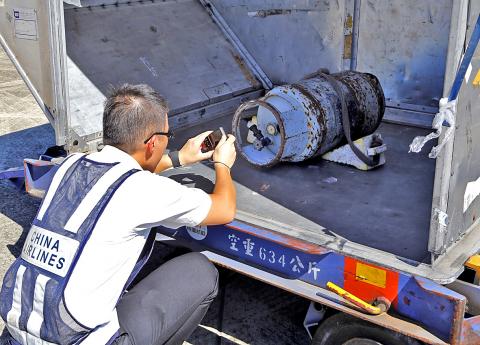Aviation security personnel at Taiwan Taoyuan International Airport were on high alert yesterday morning after receiving information that a gas cylinder had been found in the cargo container of a China Airlines passenger jet.
The airline said that Flight CI003 arrived at the airport from San Francisco at 5:05am, and its ground crew discovered the gas cylinder while unloading the cargo container. The crew immediately informed aviation police per standard operating procedures, the company said.
According to operator Taoyuan International Airport Co, aviation police officers arrived at the D5 tarmac and cordoned off the area while they waited for the bomb squad to arrive to inspect the cylinder.

Photo: Chu Pei-hsiung, Taipei Times
Fearing that the cylinder could explode, the airport operator also called in fire trucks and an ambulance.
The bomb squad declared that the cylinder contained no explosives, adding that the “timer” reported by the ground crew was actually the pressure gauge of the cylinder.
The cylinder was moved to the northeast tarmac for cargo flights for further inspection, the airport company said.
China Airlines said the cylinder belongs to its warehouse agent firm in San Francisco, and that the agent had admitted that its workers had replaced the empty cylinder with a new one and forgotten to remove the empty one.
The company added that it had taken note of the error and would compile a detailed investigative report.
It is holding its warehouse agent in San Francisco accountable for the incident, based on the terms of their contract, it said.
Han Chen-hua (韓振華), director of the Civil Aeronautics Administration’s airport transport division, said that China Airlines would be asked to strengthen its oversight mechanism.
The Civil Aviation Act (民用航空法) states that the airline could face a penalty of between NT$20,000 and NT$100,000 if it is found to be carrying dangerous items.
Since the gas cylinder does not contain pressured gas or other dangerous items, the airline can only be held responsible for not thoroughly enforcing standard procedures, he said.

An essay competition jointly organized by a local writing society and a publisher affiliated with the Chinese Communist Party (CCP) might have contravened the Act Governing Relations Between the People of the Taiwan Area and the Mainland Area (臺灣地區與大陸地區人民關係條例), the Mainland Affairs Council (MAC) said on Thursday. “In this case, the partner organization is clearly an agency under the CCP’s Fujian Provincial Committee,” MAC Deputy Minister and spokesperson Liang Wen-chieh (梁文傑) said at a news briefing in Taipei. “It also involves bringing Taiwanese students to China with all-expenses-paid arrangements to attend award ceremonies and camps,” Liang said. Those two “characteristics” are typically sufficient

A magnitude 5.9 earthquake that struck about 33km off the coast of Hualien City was the "main shock" in a series of quakes in the area, with aftershocks expected over the next three days, the Central Weather Administration (CWA) said yesterday. Prior to the magnitude 5.9 quake shaking most of Taiwan at 6:53pm yesterday, six other earthquakes stronger than a magnitude of 4, starting with a magnitude 5.5 quake at 6:09pm, occurred in the area. CWA Seismological Center Director Wu Chien-fu (吳健富) confirmed that the quakes were all part of the same series and that the magnitude 5.5 temblor was

The brilliant blue waters, thick foliage and bucolic atmosphere on this seemingly idyllic archipelago deep in the Pacific Ocean belie the key role it now plays in a titanic geopolitical struggle. Palau is again on the front line as China, and the US and its allies prepare their forces in an intensifying contest for control over the Asia-Pacific region. The democratic nation of just 17,000 people hosts US-controlled airstrips and soon-to-be-completed radar installations that the US military describes as “critical” to monitoring vast swathes of water and airspace. It is also a key piece of the second island chain, a string of

The Central Weather Administration has issued a heat alert for southeastern Taiwan, warning of temperatures as high as 36°C today, while alerting some coastal areas of strong winds later in the day. Kaohsiung’s Neimen District (內門) and Pingtung County’s Neipu Township (內埔) are under an orange heat alert, which warns of temperatures as high as 36°C for three consecutive days, the CWA said, citing southwest winds. The heat would also extend to Tainan’s Nansi (楠西) and Yujing (玉井) districts, as well as Pingtung’s Gaoshu (高樹), Yanpu (鹽埔) and Majia (瑪家) townships, it said, forecasting highs of up to 36°C in those areas